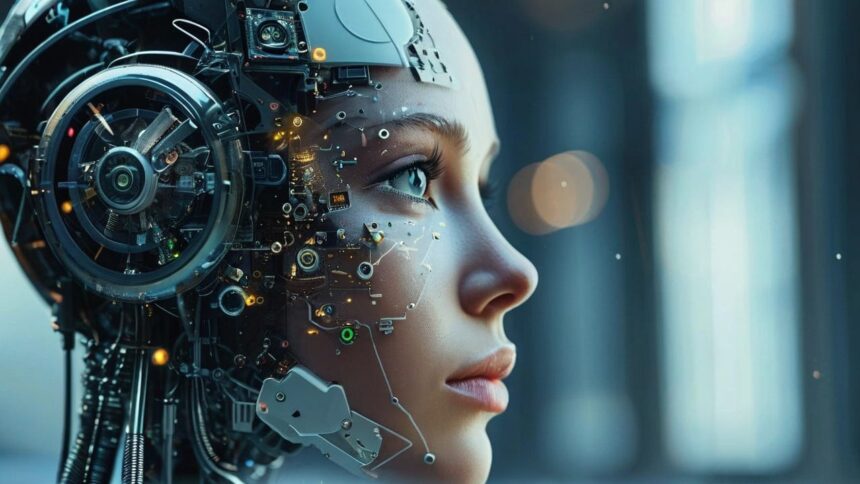Artificial intelligence (AI) is transforming the way we live, work, and interact. From smart assistants to self-driving cars, AI has integrated into numerous aspects of daily life. This technological evolution is reshaping industries, influencing decision-making processes, and even redefining human roles in the workforce. The impact of artificial intelligence on society is profound, offering both opportunities and challenges.
As AI continues to advance, it raises critical questions about its ethical implications, economic influence, and long-term effects on humanity. Understanding these changes helps us navigate the evolving landscape of artificial intelligence while maximizing its benefits and minimizing potential risks.
The Evolution of Artificial Intelligence
AI has come a long way since its inception. Initially, artificial intelligence was a theoretical concept, but over the past few decades, rapid technological progress has turned it into a practical reality. Early AI applications were limited to rule-based systems, but today, machine learning and deep learning have enabled AI to become more adaptive and capable of complex problem-solving.
The development of AI can be categorized into narrow AI, which is designed for specific tasks, and general AI, which aims to replicate human intelligence. While narrow AI is already widely used, general AI remains a theoretical goal that researchers continue to explore. The future of AI holds even more potential, with advancements expected in fields like robotics, healthcare, and finance.
AI’s Role in Various Industries
Healthcare Transformation
AI has revolutionized the healthcare sector by enhancing diagnostics, treatment planning, and patient care. Machine learning algorithms analyze vast amounts of medical data, helping doctors detect diseases early and recommend personalized treatments. AI-powered robots assist in surgeries, ensuring precision and reducing recovery times.
Moreover, AI-driven chatbots and virtual assistants provide mental health support, improving accessibility to healthcare services. As AI continues to advance, it is expected to play an even bigger role in preventive medicine and personalized therapies, ultimately saving lives and reducing medical costs.
Automation in the Workplace
Automation powered by AI is significantly transforming workplaces across various industries. Businesses utilize AI-driven tools to streamline operations, improve efficiency, and enhance customer service. Chatbots, virtual assistants, and automated analytics tools help companies optimize decision-making and improve user experiences.
However, automation has also sparked concerns about job displacement. While AI creates new opportunities, it also replaces repetitive and routine tasks, potentially impacting employment rates. To mitigate these effects, upskilling and reskilling initiatives are essential, enabling workers to adapt to AI-driven work environments.
AI in Finance and Banking
The financial industry has embraced AI for fraud detection, risk assessment, and personalized customer experiences. AI-powered algorithms analyze transaction patterns to identify fraudulent activities in real time, preventing financial crimes. Additionally, robo-advisors provide personalized investment recommendations based on user preferences and market trends.
Banks and financial institutions use AI to automate customer interactions, enhance security, and improve overall efficiency. As AI continues to evolve, it will further refine financial decision-making and risk management strategies, benefiting both consumers and businesses.
Ethical and Social Implications of AI

Privacy and Security Concerns
With AI systems processing vast amounts of personal data, privacy concerns have become a significant issue. AI-powered surveillance, facial recognition, and data analytics raise questions about data security and user privacy. Ensuring ethical AI development and implementing strong data protection policies are crucial to maintaining public trust.
Governments and organizations are working to establish regulations that govern AI usage and prevent potential abuses. Transparency and accountability in AI decision-making processes are essential to addressing privacy concerns while allowing innovation to thrive.
Bias and Discrimination in AI Systems
AI systems are only as unbiased as the data they are trained on. If training data contains biases, AI algorithms can inadvertently reinforce discrimination in areas like hiring, law enforcement, and financial services. Addressing bias in AI requires continuous monitoring, diverse data sets, and ethical AI development frameworks.
Companies and researchers must prioritize fairness in AI models to ensure equitable treatment for all individuals. By promoting responsible AI development, we can minimize biases and create technology that benefits everyone equally.
The Future of AI and Its Societal Impact
AI in Education
Education is one of the sectors that will greatly benefit from AI advancements. AI-driven personalized learning platforms adapt to individual student needs, making education more effective. Automated grading, virtual tutors, and smart content recommendations enhance the learning experience for students worldwide.
AI also plays a role in language translation and accessibility, breaking down barriers in global education. As AI-powered education tools evolve, they have the potential to bridge educational gaps and provide equal learning opportunities for students everywhere.
AI’s Role in Sustainability
Artificial intelligence is contributing to sustainability efforts by optimizing energy usage, improving climate modeling, and reducing waste. Smart grids powered by AI enhance energy efficiency, while AI-driven analytics assist in monitoring environmental changes.
AI is also being utilized in agriculture to optimize crop yields, reduce water consumption, and minimize pesticide use. These advancements contribute to a more sustainable future, balancing technological growth with environmental preservation.
Conclusion
The influence of artificial intelligence on modern society is undeniable. From healthcare to finance, AI is transforming industries, improving efficiency, and redefining human roles. While AI offers numerous benefits, ethical concerns and societal challenges must be addressed to ensure its responsible development and implementation.
By fostering ethical AI practices, investing in education and upskilling, and implementing effective regulations, society can harness the power of AI for the greater good. As AI continues to evolve, embracing its potential while mitigating risks will be crucial in shaping a future where technology and humanity coexist harmoniously.
